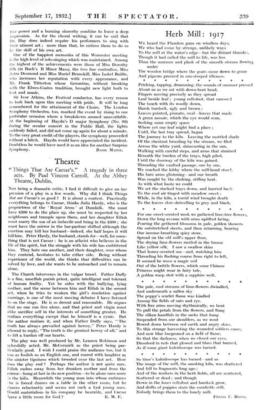Theatre
Things That Are Caesar's." A tragedy in three acts. By Paul Vincent Carroll. At the Abbey Theatre, Dublin.
NOT being a dramatic critic, I find it difficult to give an im- pression of a play in a few-words. Why did I think Things that are Caesar's so good ? It is about a contest. Practically everything belongs to Caesar, thinks Julia Hardy, who is the proprietress of the ' Royal Arms ' at Dundalk. She must have £300 to do the place up, she must be respected by her neighbours and trample upon them, and her daughter Eilish must marry the son of an imbecile and bring in the MOO ; she must have the mirror in the bar-parlour shifted although the exertion may kill her husband—indeed, she half hopes it will kill him. Peter Hardy, the husband, stands for—well, for some- thing that is not Caesar : he is an atheist who believes in the life of the spirit, but the struggle with his wife has embittered him. They hate one another, and their daughter, over whom they contend, hesitates to take either side. Being without experience of the world, she thinks that difficulties can be solved by love, and she wants to be untouched and to remain alone.
The Church intervenes in the vulgar brawl. Father Duffy is a fine, unselfish parish priest, quite intelligent and tolerant of human frailty. Yet he sides with the bullying, lying mother, and the scene between him and Eilish in the second act, when he tries to weaken the girl's resolution against marriage, is one of the most moving debates I have listened to on the stage. He is so decent and reasonable. He argues that no one can live alone, and that priest and virgin must alike sacrifice self in the interests of something greater. He realizes everything except that he himself is a cynic. But the author realizes it, and when Father Duffy says, " The truth has always prevailed against heresy," Peter Hardy is allowed to reply, "The truth is the greatest heresy of all," and to lift a burden off our hearts.
The play was well produced by Mr. Lennox Robinson and splendidly acted, Mr. McCormick as the priest being par- ticularly good. I wish I could praise the audience too, but it was as foolish as an English one, and roared with laughter at the sinister tipsiness which brooded over the last act. How does the play end ? Perhaps the author is not quite sure. Eilish rushes away from her drunken mother and from the mirror—hung at last in its new position—to be alone once more in the hills. Meanwhile the young man into whose embraces she is forced dances on a table in the other room, but he dances reluctantly and seems not such a had young man. Would materialism in his company be bearable, and Caesar






























 Previous page
Previous page